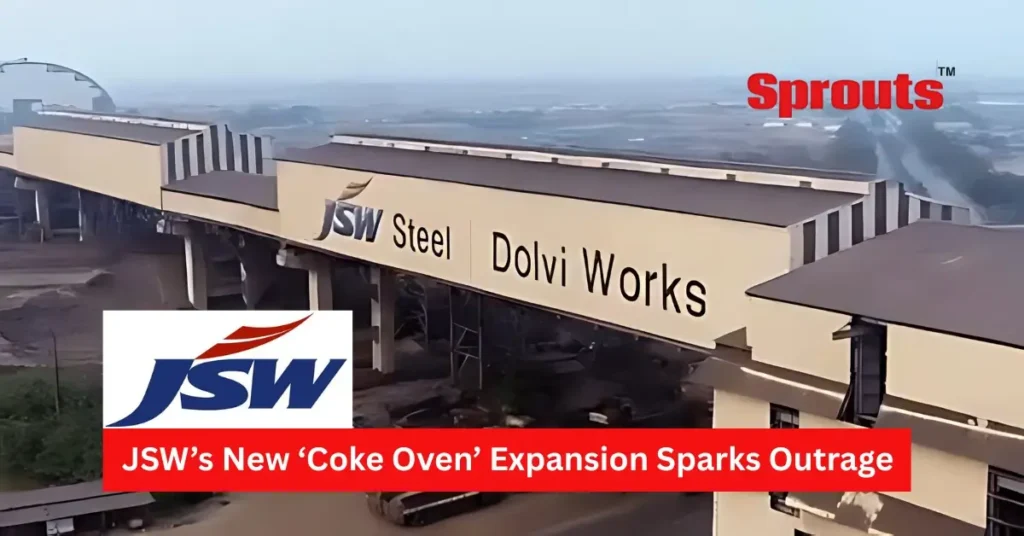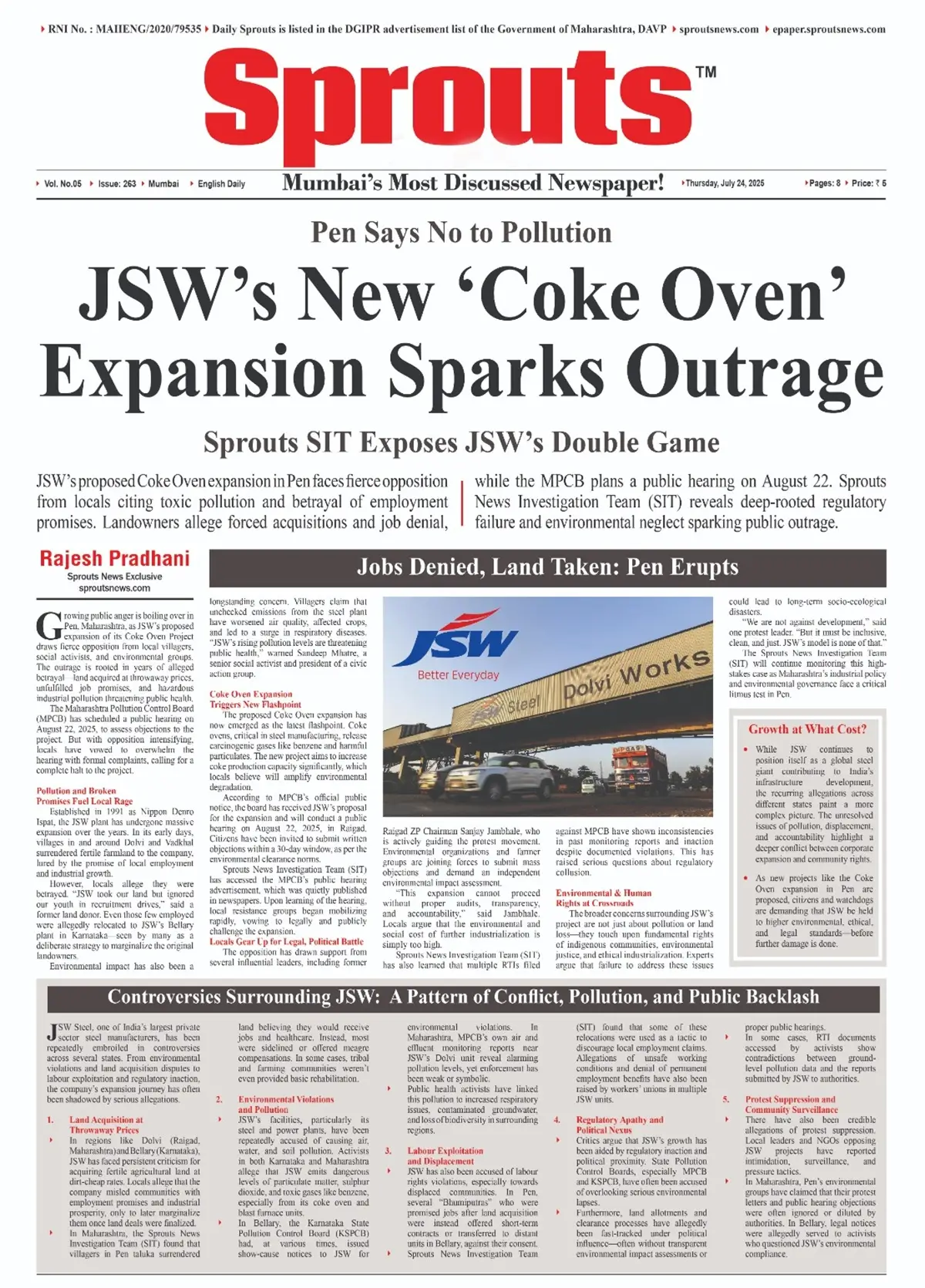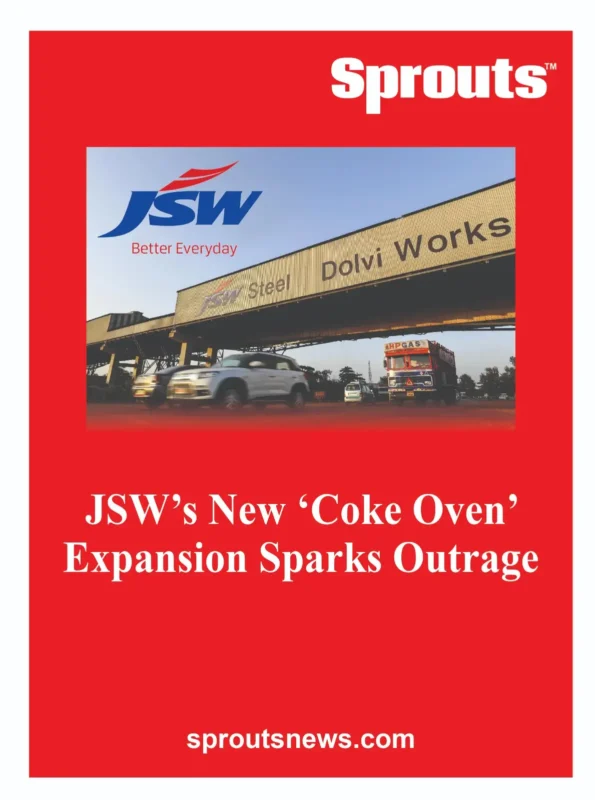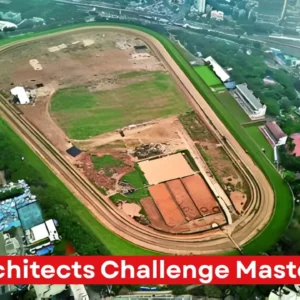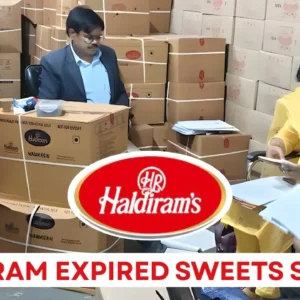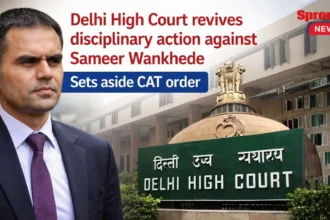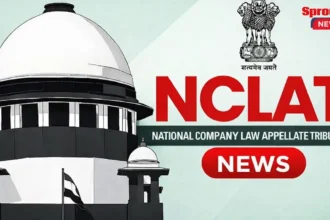JSW’s New ‘Coke Oven’ Expansion Sparks Outrage
• Pen Says No to Pollution
• Sprouts SIT Exposes JSW’s Double Game
• Jobs Denied, Land Taken: Pen Erupts
Rajesh Pradhan
Sprouts News Exclusive
- JSW’s New ‘Coke Oven’ Expansion Sparks Outrage
- • Pen Says No to Pollution
- • Sprouts SIT Exposes JSW’s Double Game
- • Jobs Denied, Land Taken: Pen Erupts
- Click Here To Download the News Attachment
- Pollution and Broken Promises Fuel Local Rage
- Coke Oven Expansion Triggers New Flashpoint
- Locals Gear Up for Legal, Political Battle
- Environmental & Human Rights at Crossroads
- 1. Land Acquisition at Throwaway Prices
- 2. Environmental Violations and Pollution
- 3. Labour Exploitation and Displacement
- 4. Regulatory Apathy and Political Nexus
- Also Read: SEBI Probes Navbharat for Illegal Dabba Trading Ad in Hindi Daily.
- Growth at What Cost?
JSW’s proposed Coke Oven expansion in Pen faces fierce opposition from locals citing toxic pollution and betrayal of employment promises. Landowners allege forced acquisitions and job denial, while the MPCB plans a public hearing on August 22. Sprouts News Investigation Team (SIT) reveals deep-rooted regulatory failure and environmental neglect sparking public outrage.
Growing public anger is boiling over in Pen, Maharashtra, as JSW’s proposed expansion of its Coke Oven Project draws fierce opposition from local villagers, social activists, and environmental groups. The outrage is rooted in years of alleged betrayal—land acquired at throwaway prices, unfulfilled job promises, and hazardous industrial pollution threatening public health.
The Maharashtra Pollution Control Board (MPCB) has scheduled a public hearing on August 22, 2025, to assess objections to the project. But with opposition intensifying, locals have vowed to overwhelm the hearing with formal complaints, calling for a complete halt to the project.
Click Here To Download the News Attachment
Pollution and Broken Promises Fuel Local Rage
Established in 1991 as Nippon Denro Ispat, the JSW plant has undergone massive expansion over the years. In its early days, villages in and around Dolvi and Vadkhal surrendered fertile farmland to the company, lured by the promise of local employment and industrial growth.
However, locals allege they were betrayed. “JSW took our land but ignored our youth in recruitment drives,” said a former land donor. Even those few employed were allegedly relocated to JSW’s Bellary plant in Karnataka—seen by many as a deliberate strategy to marginalize the original landowners.
Environmental impact has also been a longstanding concern. Villagers claim that unchecked emissions from the steel plant have worsened air quality, affected crops, and led to a surge in respiratory diseases. “JSW’s rising pollution levels are threatening public health,” warned Sandeep Mhatre, a senior social activist and president of a civic action group.
Coke Oven Expansion Triggers New Flashpoint
The proposed Coke Oven expansion has now emerged as the latest flashpoint. Coke ovens, critical in steel manufacturing, release carcinogenic gases like benzene and harmful particulates. The new project aims to increase coke production capacity significantly, which locals believe will amplify environmental degradation.
According to MPCB’s official public notice, the board has received JSW’s proposal for the expansion and will conduct a public hearing on August 22, 2025, in Raigad. Citizens have been invited to submit written objections within a 30-day window, as per the environmental clearance norms.
Sprouts News Investigation Team (SIT) has accessed the MPCB’s public hearing advertisement, which was quietly published in newspapers. Upon learning of the hearing, local resistance groups began mobilizing rapidly, vowing to legally and publicly challenge the expansion.
Locals Gear Up for Legal, Political Battle
The opposition has drawn support from several influential leaders, including former Raigad ZP Chairman Sanjay Jambhale, who is actively guiding the protest movement. Environmental organizations and farmer groups are joining forces to submit mass objections and demand an independent environmental impact assessment.
“This expansion cannot proceed without proper audits, transparency, and accountability,” said Jambhale. Locals argue that the environmental and social cost of further industrialization is simply too high.
Sprouts News Investigation Team (SIT) has also learned that multiple RTIs filed against MPCB have shown inconsistencies in past monitoring reports and inaction despite documented violations. This has raised serious questions about regulatory collusion.
Environmental & Human Rights at Crossroads
The broader concerns surrounding JSW’s project are not just about pollution or land loss—they touch upon fundamental rights of indigenous communities, environmental justice, and ethical industrialization. Experts argue that failure to address these issues could lead to long-term socio-ecological disasters.
“We are not against development,” said one protest leader. “But it must be inclusive, clean, and just. JSW’s model is none of that.”
The Sprouts News Investigation Team (SIT) will continue monitoring this high-stakes case as Maharashtra’s industrial policy and environmental governance face a critical litmus test in Pen.
Controversies Surrounding JSW: A Pattern of Conflict, Pollution, and Public Backlash
JSW Steel, one of India’s largest private sector steel manufacturers, has been repeatedly embroiled in controversies across several states. From environmental violations and land acquisition disputes to labour exploitation and regulatory inaction, the company’s expansion journey has often been shadowed by serious allegations.
1. Land Acquisition at Throwaway Prices
In regions like Dolvi (Raigad, Maharashtra) and Bellary (Karnataka), JSW has faced persistent criticism for acquiring fertile agricultural land at dirt-cheap rates. Locals allege that the company misled communities with employment promises and industrial prosperity, only to later marginalize them once land deals were finalized.
In Maharashtra, the Sprouts News Investigation Team (SIT) found that villagers in Pen taluka surrendered land believing they would receive jobs and healthcare. Instead, most were sidelined or offered meagre compensations. In some cases, tribal and farming communities weren’t even provided basic rehabilitation.
2. Environmental Violations and Pollution
JSW’s facilities, particularly its steel and power plants, have been repeatedly accused of causing air, water, and soil pollution. Activists in both Karnataka and Maharashtra allege that JSW emits dangerous levels of particulate matter, sulphur dioxide, and toxic gases like benzene, especially from its coke oven and blast furnace units.
In Bellary, the Karnataka State Pollution Control Board (KSPCB) had, at various times, issued show-cause notices to JSW for environmental violations. In Maharashtra, MPCB’s own air and effluent monitoring reports near JSW’s Dolvi unit reveal alarming pollution levels, yet enforcement has been weak or symbolic.
Public health activists have linked this pollution to increased respiratory issues, contaminated groundwater, and loss of biodiversity in surrounding regions.
3. Labour Exploitation and Displacement
JSW has also been accused of labour rights violations, especially towards displaced communities. In Pen, several “Bhumiputras” who were promised jobs after land acquisition were instead offered short-term contracts or transferred to distant units in Bellary, against their consent.
Sprouts News Investigation Team (SIT) found that some of these relocations were used as a tactic to discourage local employment claims. Allegations of unsafe working conditions and denial of permanent employment benefits have also been raised by workers’ unions in multiple JSW units.
4. Regulatory Apathy and Political Nexus
Critics argue that JSW’s growth has been aided by regulatory inaction and political proximity. State Pollution Control Boards, especially MPCB and KSPCB, have often been accused of overlooking serious environmental lapses.
Furthermore, land allotments and clearance processes have allegedly been fast-tracked under political influence—often without transparent environmental impact assessments or proper public hearings.
In some cases, RTI documents accessed by activists show contradictions between ground-level pollution data and the reports submitted by JSW to authorities.
Also Read: SEBI Probes Navbharat for Illegal Dabba Trading Ad in Hindi Daily.
5. Protest Suppression and Community Surveillance
There have also been credible allegations of protest suppression. Local leaders and NGOs opposing JSW projects have reported intimidation, surveillance, and pressure tactics.
In Maharashtra, Pen’s environmental groups have claimed that their protest letters and public hearing objections were often ignored or diluted by authorities. In Bellary, legal notices were allegedly served to activists who questioned JSW’s environmental compliance.
Growth at What Cost?
While JSW continues to position itself as a global steel giant contributing to India’s infrastructure development, the recurring allegations across different states paint a more complex picture. The unresolved issues of pollution, displacement, and accountability highlight a deeper conflict between corporate expansion and community rights.
As new projects like the Coke Oven expansion in Pen are proposed, citizens and watchdogs are demanding that JSW be held to higher environmental, ethical, and legal standards—before further damage is done.


